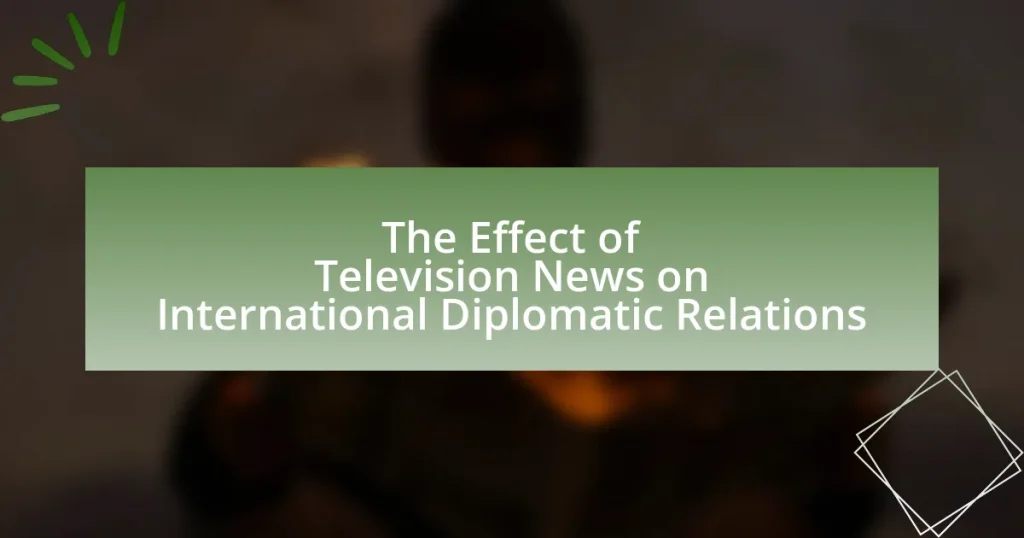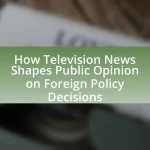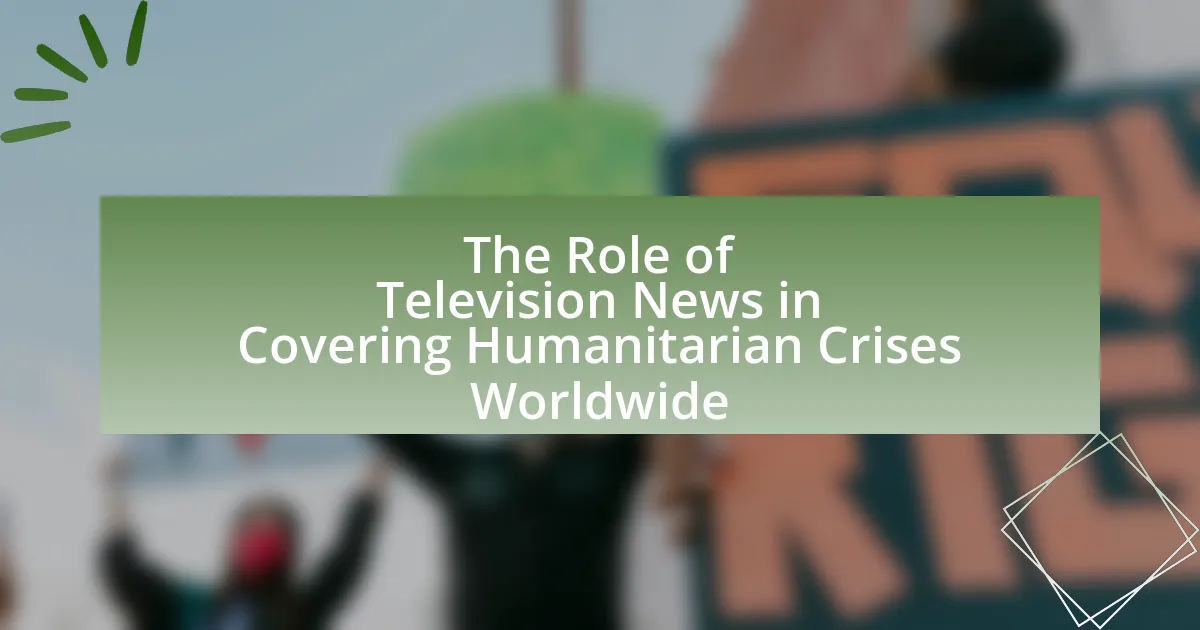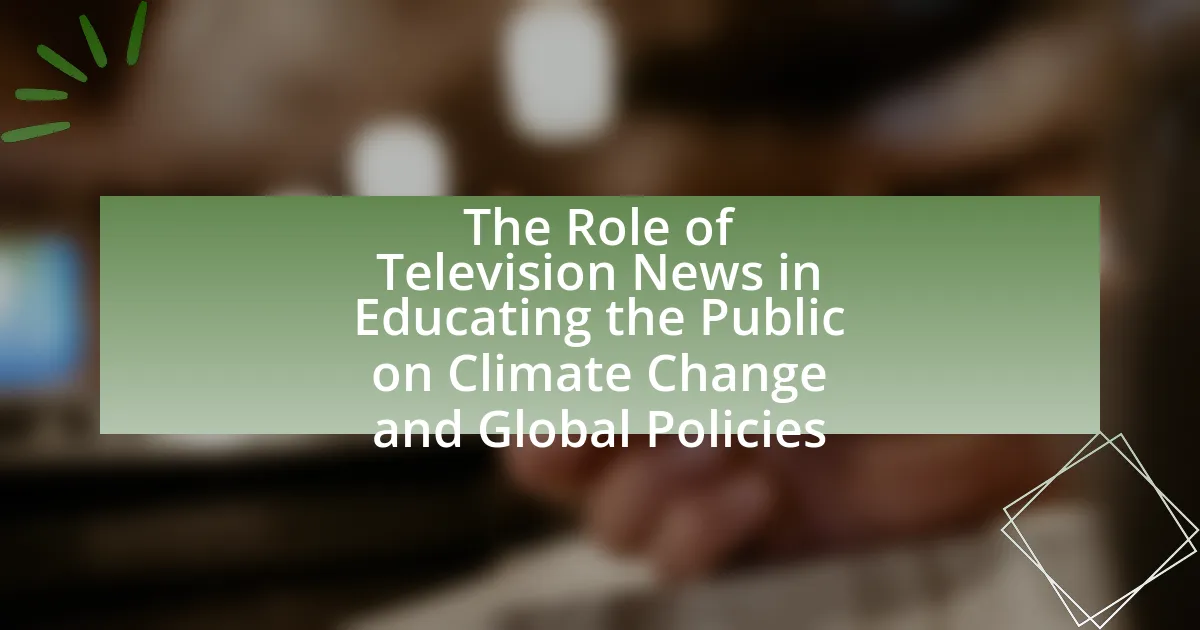Television news plays a crucial role in shaping international diplomatic relations by influencing public perception and framing narratives around global events. The article examines how media coverage can mobilize public sentiment, impact policy decisions, and alter diplomatic dynamics, highlighting the effects of sensationalism, framing, and the timing of news broadcasts. It also explores the differences in media responses across various political systems, the implications of cultural biases, and the challenges posed by social media in the context of diplomacy. Additionally, the article discusses best practices for responsible reporting and the importance of media literacy in understanding international news coverage.
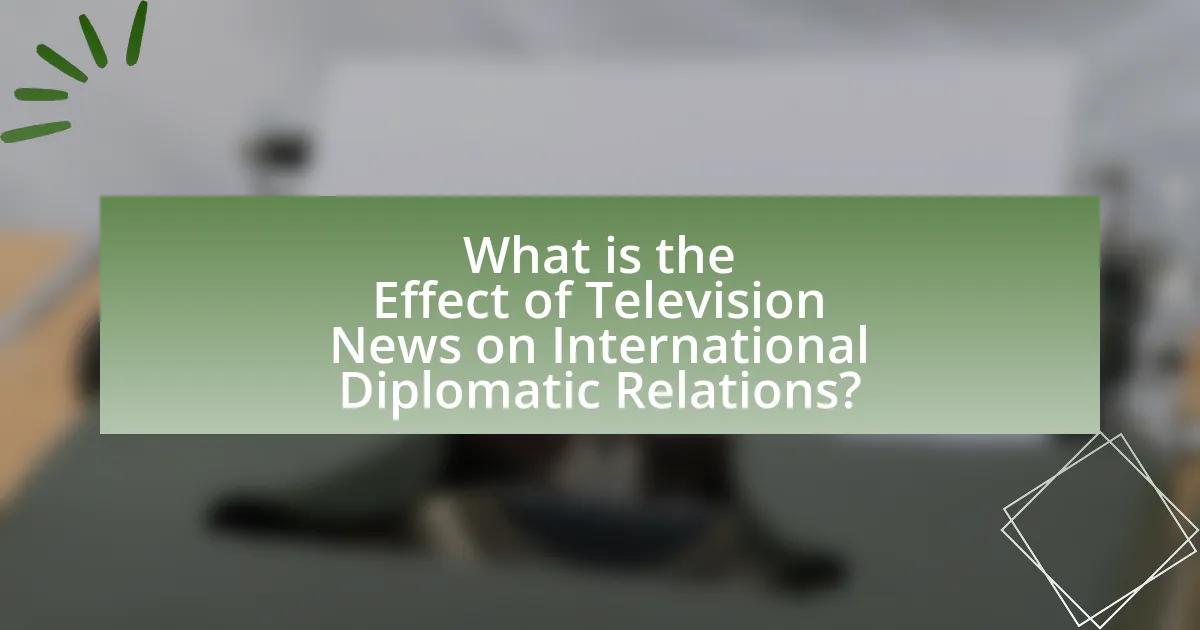
What is the Effect of Television News on International Diplomatic Relations?
Television news significantly influences international diplomatic relations by shaping public perception and framing narratives around global events. The portrayal of conflicts, humanitarian crises, and diplomatic negotiations can sway public opinion, which in turn pressures governments to act or respond in specific ways. For instance, the extensive coverage of the Rwandan Genocide in 1994 led to increased international awareness and calls for intervention, highlighting how media can mobilize public sentiment and influence policy decisions. Furthermore, the 24-hour news cycle often prioritizes sensationalism, which can distort facts and escalate tensions between nations, as seen in the coverage of the Iraq War in 2003. Thus, television news acts as a powerful tool that can either foster understanding or exacerbate conflicts in international relations.
How does television news influence public perception of international events?
Television news significantly influences public perception of international events by shaping narratives and framing issues. The way news outlets present information, including the selection of stories, the language used, and the visuals shown, can create specific interpretations of events. For instance, studies have shown that extensive coverage of a particular conflict can lead to increased public concern and support for intervention, as seen during the Gulf War in the early 1990s, where televised images of the conflict galvanized public opinion in favor of military action. Furthermore, the framing of international events, such as portraying a country as a threat or a victim, can lead to polarized perceptions among viewers, impacting their understanding and attitudes toward foreign policy. This influence is reinforced by the fact that television remains a primary source of news for many individuals, making its role in shaping public perception critical in the context of international relations.
What role does media framing play in shaping diplomatic narratives?
Media framing significantly influences the construction of diplomatic narratives by shaping public perception and understanding of international events. Through selective emphasis on certain aspects of a story, media outlets can highlight specific viewpoints, thereby guiding audience interpretation and response. For instance, a study by Entman (1993) demonstrates that framing can affect how audiences perceive the legitimacy of foreign policy actions, as different frames can lead to varying levels of support or opposition among the public. This framing effect is crucial in diplomatic contexts, where the portrayal of events can alter the dynamics of international relations and influence decision-making processes among policymakers.
How do different news formats affect audience understanding of international issues?
Different news formats significantly influence audience understanding of international issues by shaping how information is presented and perceived. For instance, visual formats like television news can enhance emotional engagement and retention of complex topics through imagery and storytelling, making international issues more relatable. Research indicates that viewers of televised news are more likely to remember key details and develop emotional responses compared to those consuming text-based news, as demonstrated in studies by the Pew Research Center, which found that 63% of viewers felt more informed about global events after watching news segments. Conversely, text-based formats, such as articles or reports, often provide more in-depth analysis and context, allowing audiences to engage critically with the information. This duality in formats highlights the importance of presentation in shaping public understanding and discourse surrounding international relations.
Why is the timing of news broadcasts significant in diplomatic contexts?
The timing of news broadcasts is significant in diplomatic contexts because it can influence public perception and international relations. For instance, broadcasting critical news during peak viewing hours can amplify its impact, shaping how governments and citizens respond to diplomatic events. Historical examples, such as the coverage of the Gulf War in 1991, demonstrate that timely reporting can sway public opinion and affect policy decisions. Additionally, the synchronization of news broadcasts with key diplomatic announcements can either bolster or undermine negotiations, as seen in the timing of announcements during the Iran nuclear deal discussions. Thus, the strategic timing of news broadcasts plays a crucial role in shaping diplomatic narratives and outcomes.
How does breaking news impact diplomatic negotiations?
Breaking news significantly impacts diplomatic negotiations by shaping public perception and influencing the urgency of responses from negotiators. When critical events unfold, such as conflicts or political crises, the immediate coverage can pressure diplomats to act swiftly, often leading to hastily made decisions that may not align with long-term strategic interests. For instance, during the Arab Spring, real-time reporting affected international responses and negotiations, as governments felt compelled to react to public sentiment and media portrayal. This dynamic illustrates how breaking news can alter the course of diplomatic discussions, pushing for rapid resolutions that may overlook comprehensive analysis or consensus-building.
What are the consequences of delayed reporting on international relations?
Delayed reporting can significantly undermine international relations by creating misinformation, eroding trust, and escalating conflicts. When news is not reported promptly, it can lead to misunderstandings between nations, as timely information is crucial for diplomatic decision-making. For instance, during the 2011 Arab Spring, delayed reporting on protests led to varied international responses, which complicated diplomatic relations and affected foreign policy decisions. Furthermore, delayed reporting can allow rumors to proliferate, causing nations to react defensively or aggressively based on inaccurate information, as seen in the 2014 Ukraine crisis, where delayed coverage contributed to heightened tensions. Thus, the consequences of delayed reporting include increased misinformation, diminished trust, and potential escalation of conflicts in international relations.
What are the potential risks of sensationalism in television news?
Sensationalism in television news poses significant risks, including the distortion of facts, which can lead to public misinformation. When news outlets prioritize dramatic storytelling over accurate reporting, they may exaggerate events or omit critical context, resulting in a misinformed audience. This misrepresentation can escalate tensions between nations, as sensationalized coverage of international events may provoke fear or hostility, undermining diplomatic relations. For instance, studies have shown that sensationalist reporting during conflicts can exacerbate public perceptions of threat, leading to increased support for aggressive foreign policies. Therefore, the potential risks of sensationalism in television news include the erosion of trust in media, the spread of misinformation, and the destabilization of international relations.
How can sensationalist reporting lead to diplomatic tensions?
Sensationalist reporting can lead to diplomatic tensions by distorting facts and amplifying conflicts, which can provoke strong emotional reactions from the public and government officials. For instance, exaggerated portrayals of events, such as conflicts or political disputes, can create a perception of threat or hostility between nations. This was evident during the 2003 Iraq War when media coverage often sensationalized the situation, leading to increased anti-American sentiment in various countries and straining diplomatic relations. Such reporting can escalate misunderstandings and hinder constructive dialogue, ultimately resulting in heightened tensions between nations.
What measures can be taken to mitigate the negative effects of sensationalism?
To mitigate the negative effects of sensationalism, media organizations should prioritize accuracy and context in their reporting. Implementing strict editorial guidelines that emphasize fact-checking and balanced perspectives can reduce the prevalence of sensationalized content. Research indicates that news outlets adhering to ethical journalism standards experience higher audience trust and engagement, which can counteract sensationalism. For instance, a study by the Pew Research Center found that 62% of Americans believe that news organizations should focus on reporting facts rather than sensational stories. Additionally, promoting media literacy among audiences can empower viewers to critically evaluate news sources and discern sensationalism, further diminishing its impact on public perception and international diplomatic relations.

How do different countries respond to television news coverage?
Different countries respond to television news coverage based on their political systems, cultural contexts, and media regulations. For instance, in democratic nations like the United States, television news is often viewed as a platform for diverse opinions, leading to public discourse and sometimes influencing policy decisions. Conversely, in authoritarian regimes such as North Korea, state-controlled television news serves to propagate government narratives, limiting public access to independent information and shaping national sentiment in favor of the ruling party. Research indicates that media coverage can significantly impact diplomatic relations; for example, a study by the Pew Research Center found that negative news coverage can lead to increased tensions between countries, while positive coverage can foster cooperation.
What strategies do governments use to manage media narratives?
Governments use several strategies to manage media narratives, including direct communication, regulation of media content, and strategic partnerships with media organizations. Direct communication involves issuing press releases and holding press conferences to shape the narrative around specific issues. For example, during crises, governments often provide timely updates to control the information flow and mitigate misinformation. Regulation of media content can include laws that restrict certain types of reporting or promote state-sponsored narratives, as seen in countries with strict media controls. Strategic partnerships with media organizations can involve collaboration on news coverage, ensuring that government perspectives are prominently featured. These strategies are evident in various contexts, such as the U.S. government’s use of media briefings during the COVID-19 pandemic to influence public perception and behavior.
How do state-controlled media differ from independent outlets in reporting international news?
State-controlled media differ from independent outlets in reporting international news primarily through their alignment with government narratives and censorship practices. State-controlled media often prioritize the interests and perspectives of the ruling government, leading to biased reporting that supports official policies and downplays dissenting views. For example, during the 2014 Ukraine crisis, Russian state media portrayed the conflict in a manner that justified government actions, while independent outlets provided a broader range of perspectives, including critical analyses of the Kremlin’s role. This difference in reporting can significantly influence public perception and international diplomatic relations, as biased narratives can shape national attitudes towards foreign countries and conflicts.
What impact does censorship have on diplomatic relations?
Censorship significantly impacts diplomatic relations by restricting the flow of information and shaping public perception. When a government censors media, it can lead to misunderstandings and mistrust between nations, as the lack of transparency may cause foreign governments to question the intentions and credibility of the censoring state. For instance, during the Cold War, censorship in the Soviet Union created a barrier to open dialogue with Western nations, contributing to heightened tensions and conflicts. Furthermore, censorship can provoke backlash from international communities, leading to sanctions or diplomatic isolation, as seen in cases like North Korea, where extensive media control has resulted in strained relations with multiple countries.
How do cultural differences affect the interpretation of news coverage?
Cultural differences significantly affect the interpretation of news coverage by shaping how audiences perceive and understand information. For instance, individualistic cultures, such as those in the United States, may focus on personal stories and individual achievements in news narratives, while collectivist cultures, like those in Japan, may emphasize community impact and social harmony. This divergence can lead to varying interpretations of the same news event; for example, a report on a protest may be viewed as a fight for freedom in one culture and as a disruption of social order in another. Research by Hall (1976) in “Beyond Culture” highlights how high-context cultures rely on implicit communication and shared understanding, which can lead to misinterpretations when news is presented in a low-context manner. Thus, cultural frameworks fundamentally influence how news is received and understood across different societies.
What are the implications of cultural biases in international news reporting?
Cultural biases in international news reporting can lead to misrepresentation and misunderstanding of global events, which negatively impacts diplomatic relations. When news outlets prioritize certain cultural perspectives, they may distort facts or omit critical context, resulting in skewed narratives that influence public opinion and policy decisions. For instance, studies have shown that Western media often portray non-Western countries through a lens of stereotypes, which can foster prejudice and hinder constructive dialogue. This selective reporting can escalate tensions between nations, as misinterpretations of events may provoke diplomatic disputes or exacerbate conflicts.
How can cross-cultural communication improve diplomatic relations?
Cross-cultural communication can improve diplomatic relations by fostering mutual understanding and reducing misunderstandings between nations. Effective communication allows diplomats to convey their countries’ perspectives and cultural nuances, which can lead to more informed decision-making and conflict resolution. For instance, the 2015 Iran nuclear deal negotiations highlighted the importance of understanding cultural contexts, as diplomats from different backgrounds navigated complex issues through dialogue that respected each party’s values and concerns. This approach not only facilitated agreement but also built trust, demonstrating that cross-cultural communication is essential for successful diplomacy.
What role do international organizations play in regulating news coverage?
International organizations play a crucial role in regulating news coverage by establishing guidelines and standards that promote ethical journalism and protect freedom of expression. For instance, organizations like the United Nations Educational, Scientific and Cultural Organization (UNESCO) advocate for media literacy and the responsible dissemination of information, which helps to combat misinformation and enhance the quality of news reporting. Additionally, the Organization for Security and Co-operation in Europe (OSCE) monitors media freedom and provides recommendations to member states on how to uphold journalistic integrity, thereby influencing national policies on news coverage. These efforts are essential in fostering a media environment that supports democratic values and international cooperation, ultimately impacting diplomatic relations among countries.
How do organizations like the UN respond to media portrayals of conflicts?
Organizations like the UN respond to media portrayals of conflicts by actively engaging with the media to provide accurate information and context. The UN often issues press releases, holds briefings, and utilizes social media platforms to counter misinformation and clarify its positions on conflicts. For instance, during the Syrian civil war, the UN frequently addressed media narratives by highlighting humanitarian needs and the impact of violence on civilians, aiming to shape public perception and influence diplomatic discussions. This proactive approach helps ensure that media coverage aligns more closely with the realities on the ground, thereby fostering informed international dialogue and response.
What guidelines exist for ethical reporting on international issues?
Ethical reporting on international issues is guided by principles such as accuracy, fairness, and accountability. These guidelines emphasize the importance of verifying information before publication, ensuring that diverse perspectives are represented, and avoiding sensationalism that could mislead audiences. For instance, the Society of Professional Journalists’ Code of Ethics advocates for journalists to seek truth and report it, which includes providing context to avoid misinterpretation of international events. Additionally, the International Federation of Journalists stresses the need for respect for human rights and cultural sensitivities, which is crucial in maintaining diplomatic relations. These guidelines are essential for fostering trust and credibility in international reporting, ultimately influencing how nations perceive and interact with one another.
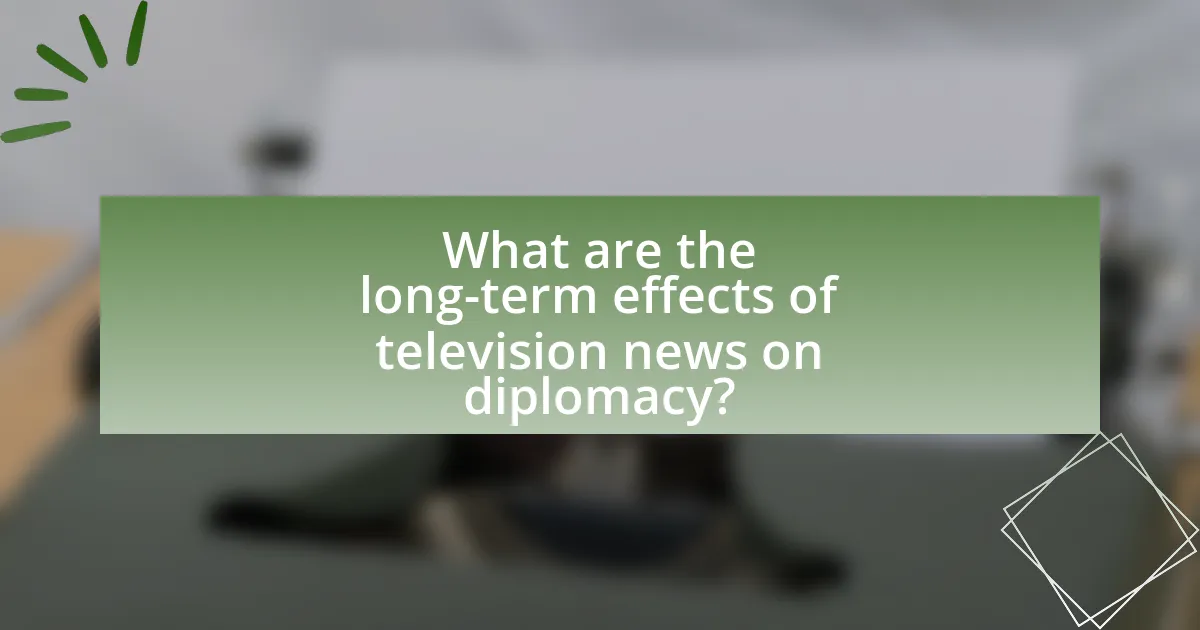
What are the long-term effects of television news on diplomacy?
Television news has a significant long-term effect on diplomacy by shaping public perception and influencing governmental policies. The constant coverage of international events creates a more informed public, which can pressure governments to adopt certain diplomatic stances. For instance, the 24-hour news cycle has led to increased scrutiny of foreign policy decisions, as seen during the Vietnam War, where televised images of conflict swayed public opinion and ultimately affected U.S. diplomatic strategies. Additionally, television news can facilitate real-time communication between nations, fostering transparency and accountability, which can enhance diplomatic relations. Studies have shown that media portrayal of international issues can lead to shifts in public opinion, thereby impacting the diplomatic landscape over time.
How does consistent media coverage shape foreign policy decisions?
Consistent media coverage significantly influences foreign policy decisions by shaping public perception and political discourse. When media outlets consistently report on specific international issues, they create a narrative that can pressure policymakers to respond in alignment with public sentiment. For instance, the extensive media coverage of the humanitarian crisis in Syria led to increased public awareness and calls for intervention, which in turn influenced the U.S. government’s decisions regarding military involvement. This demonstrates that sustained media attention can elevate certain issues on the political agenda, compelling leaders to act in response to public opinion shaped by that coverage.
What examples illustrate the impact of media on policy changes?
Media significantly influences policy changes, as evidenced by the coverage of the Vietnam War, which shifted public opinion and led to changes in U.S. foreign policy. The graphic images and reports broadcasted by television networks revealed the war’s brutality, prompting widespread protests and ultimately contributing to the U.S. withdrawal from Vietnam in 1973. Another example is the role of media in the Arab Spring, where social media platforms facilitated the organization of protests and raised global awareness, leading to regime changes in countries like Tunisia and Egypt. These instances demonstrate how media can shape public perception and pressure policymakers to respond to societal demands.
How do public opinion polls influenced by news coverage affect diplomatic actions?
Public opinion polls influenced by news coverage significantly affect diplomatic actions by shaping policymakers’ perceptions of public sentiment and guiding their decisions. When news outlets report on public opinion, they can amplify certain viewpoints, leading to increased pressure on government officials to align their diplomatic strategies with the prevailing public sentiment. For instance, a Gallup poll from 2003 indicated that public support for the Iraq War was heavily influenced by media coverage, which in turn affected the U.S. government’s diplomatic posture and military decisions. This demonstrates that the interplay between public opinion, news coverage, and diplomatic actions is critical, as leaders often prioritize maintaining public support to ensure political stability and legitimacy.
What are the implications of social media on traditional television news and diplomacy?
Social media significantly impacts traditional television news and diplomacy by altering information dissemination and audience engagement. Traditional television news, once the primary source of information, now competes with social media platforms that provide real-time updates and diverse perspectives, leading to a decline in viewership and trust in conventional news outlets. For instance, a Pew Research Center study in 2021 indicated that 53% of U.S. adults often get news from social media, highlighting a shift in how audiences consume information.
In terms of diplomacy, social media enables direct communication between political leaders and the public, bypassing traditional media filters. This shift can lead to rapid responses to international events, as seen during the Arab Spring, where social media played a crucial role in mobilizing protests and influencing diplomatic relations. Furthermore, the immediacy of social media can escalate tensions, as seen in various geopolitical conflicts where tweets or posts have sparked diplomatic disputes.
Overall, social media’s influence on traditional television news and diplomacy reshapes how information is shared and perceived, impacting public opinion and international relations.
How has the rise of social media changed the landscape of international news reporting?
The rise of social media has fundamentally transformed international news reporting by enabling real-time dissemination of information and amplifying diverse voices. Traditional media outlets, which once held a monopoly on news distribution, now compete with platforms like Twitter and Facebook, where users can share news instantly, often bypassing editorial oversight. This shift has led to a more democratized news landscape, allowing for grassroots reporting and the rapid spread of information during global events, such as the Arab Spring, where social media played a crucial role in mobilizing protests and shaping narratives. Furthermore, the immediacy of social media has pressured traditional news organizations to adapt their reporting strategies, often prioritizing speed over thorough fact-checking, which can lead to the spread of misinformation.
What challenges do diplomats face in the age of instant news dissemination?
Diplomats face significant challenges in the age of instant news dissemination, primarily due to the rapid spread of information that can lead to misinformation and misinterpretation of diplomatic actions. The immediacy of news cycles pressures diplomats to respond quickly, often before fully assessing the situation, which can result in hasty statements or actions that may escalate tensions. For instance, during the Arab Spring, social media played a crucial role in shaping public perception and influencing diplomatic relations, as governments struggled to keep pace with the evolving narrative. Additionally, the potential for leaks and unauthorized disclosures can undermine negotiations and diplomatic strategies, as sensitive information may be exposed to the public prematurely. These factors illustrate how the landscape of diplomacy has transformed, requiring diplomats to navigate a complex environment where public opinion can shift rapidly based on instantaneous news coverage.
What best practices can be adopted for responsible reporting on international relations?
Responsible reporting on international relations should prioritize accuracy, context, and impartiality. Journalists must verify facts through multiple credible sources to ensure the information presented is reliable, as inaccuracies can lead to misunderstandings and escalate tensions between nations. Providing context is essential; reporters should explain the historical and cultural background of the issues being covered, which helps audiences grasp the complexities of international relations. Impartiality is crucial; journalists should strive to present multiple viewpoints, avoiding bias that could influence public perception and diplomatic relations. For instance, the Reuters Institute for the Study of Journalism emphasizes the importance of balanced reporting in fostering informed public discourse, which is vital for maintaining healthy international relations.
How can journalists balance sensationalism with factual reporting?
Journalists can balance sensationalism with factual reporting by adhering to ethical guidelines and prioritizing accuracy over drama. This involves verifying information through multiple credible sources before publication, ensuring that the narrative remains grounded in reality. For instance, the Society of Professional Journalists emphasizes the importance of seeking truth and reporting it, which helps mitigate the risks of sensationalism. By focusing on comprehensive reporting that includes context and diverse perspectives, journalists can provide a more nuanced view that informs rather than inflates public perception.
What role does media literacy play in understanding international news coverage?
Media literacy is essential for understanding international news coverage as it equips individuals with the skills to critically analyze and evaluate news sources. This critical analysis enables audiences to discern bias, identify misinformation, and understand the context behind news stories, which is particularly important in a globalized world where news can influence public opinion and diplomatic relations. Studies indicate that media literacy programs can significantly improve individuals’ ability to assess the credibility of news, thereby fostering informed citizenship and promoting a more nuanced understanding of international issues. For instance, research by the National Association for Media Literacy Education highlights that individuals with higher media literacy are better at recognizing biased reporting and understanding the implications of international news on diplomatic relations.
